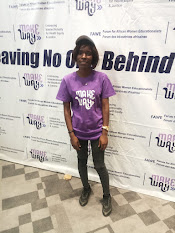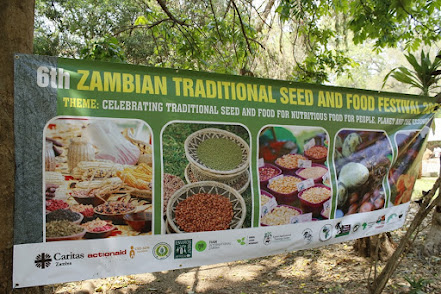ADOLESCENTS VOICE OUT CHALLENGES THEY FACE IN ACCESSING S-R-H SERVICES
“If only I knew that there were services such as Sexual and Reproductive Health Services, I could not have fallen pregnant while I was still at school,” Faith Buyamba, a youth based in Kitwe, on the Copper belt province believes.
 |
| Faith |
Faith who fell pregnant at the age of 17, recalls that after missing her menstrual periods ,she decided to go for a pregnancy test but because of the way she was treated by some healthcare providers she opted to abort, after being advised by her friends but did not succeed.
“I went to do a pregnancy test, because I wanted to be sure whether I was pregnant or not after missing my periods.
However, I was afraid to go to the nearby health facility because there were a lot of people I knew who were so close to my mum. So I was afraid that if I went there they could tell my mother that I was pregnant knowing how tough she is.
“I decided to do a pregnant test from some health workers who were offering services within my community during their community outreach program and after discovering that I was pregnant the health workers started shouting at me saying, “at your age, you are supposed to be in school but you are pregnant and you are going to drop out of school.”
This she said did not augur well with her especially that she did not expect to be scold by a health worker.
Faith who is a mother to a 7-year-old girl has now gone back to school under the school Re-entry Policy and is happy that youths are now able to seek family planning services as she believes that doing so has the potential to help them prevent getting unwanted pregnancies.
Faith says she has been encouraging her fellow youths who are sexually active to seek health services that will help them not to fall pregnant.
She also hailed the Forum for African Women Educationalist of Zambia-FAWEZA Chapter which in partnership with its consortium partners is implementing a five-year program -2021-2025 dubbed "Make Way Program" which aims at increasing access to Sexual Reproductive Health and Rights-SRHR information and services for the marginalized young people.
“A lot of us young people will be able to know our rights to access Sexual Reproductive Health services from our respective communities,” she said.
 |
| Some participants of the Dialogue meeting for key stakeholders and marginalised youth held in Lusaka |
She also advised health workers to always be receptive to the people especially the youth when they are seeking services from health facilities and avoid vetting their anger on patients because they are there to save the people.
Reproductive Health is defined as state of complete physical ,mental and social wel-being.....in all matters related to reproductive system which implies people are able to have a satisfying and safe sex life and that they have the capacity to reproduce and the freedom to decide if ,when and how often to do so.
The International Conference on Population and Development referred to the term Reproductive Rights as embracing certain human rights that are already recognized in ........international human rights documents and other consensus documents. The most mentioned consensus documents are the Universal Declaration of Human Rights and the Declaration and Program of Action of the World Conference on Human Rights Vienna, June 1993.
Studies indicate that young people with disabilities and other marginalised groups of people also suffer double the consequences of limited access to Sexual Reproductive Health Rights Information because of their compounded vulnerability.
Prince Mwansa aged 30 from Mufulira district who is living with albinism lamented that youths like him and others living with disabilities face a lot of challenges when accessing Sexual Reproductive Health Services as they are subjected to covering long distances to health facilities and also suffer discrimination in communities, which he said impact negatively on access to these services.
“Us who live with albinism, face discrimination when accessing services because of myths and misconceptions in the communities about us......Sometimes we avoid visiting health facilities for fear of being laughed at by our fellow youths. Most of the facilities are inaccessible to Youths who use wheelchairs and crunches because of stairs.
 |
| Prince Mwansa |
He says there is a need to sensitize the public that people who are living with disabilities are also human beings who should not be discriminated against or deprived of any health services because
Access to SRHR information allows young people to make informed decision-making.
Mathews Ngandwe from Mansa also bemoaned the negative attitude exhibited by some health workers towards the youths especially those living with disability.
Mathews said young people are usually not given the attention they deserve when they are seeking SRHR services while those who are disabled like him are in most cases discriminated.
"I don't like the way some Health care providers treat or respond to us when when go to these health centers. For instance they could say, in Bemba language ,iwe naiwe wemulema fyashi ulefwaya ukalafitwala kwisa fima condoms.(Translated as: You are lame what are you going to do with these condoms you want to get. I feel discouraged and descriminated when I don't receive information or some health commodities such as condoms which I may want to use, " Mathews said.
.jpeg) |
| Mathews Ngandwe |
However, the Zambia government acknowledges that it is cognizant of some of the challenges in accessing Sexual Reproductive Health Rights information and services, especially for young people with disabilities .
"As proponent of sustainable development ,Zambia stands with global space in recognizing that sustainable societies rely on empowered youth who are able to exercise their rights to obtain the highest possible level of health and education ,access to quality health services and education which are universal and free for all. It is for this reason that the government continues to explore effective modalities of ensuring that young people have sufficient and relevant sexuality information that will empower them to make well informed choices, " Ministry of Community Development and Social Services Permanent Secretary, Angela Kawandami said.
Ms. Kawandami reaffirmed the government’s commitment to ensuring that marginalized youths such as young people with disabilities are empowered so that they are not victims of consequences of inadequate access to sexual reproductive health rights information and services.
Meanwhile Education Minister ,Douglas Syakalima who is concerned about the high rate of pregnancy among school going girls underscored the importance of SRH saying it helps in keeping girls in school by preventing early pregnancy.
The Minister however, regretted some misconceptions surrounding the subject matter.
"When people hear the word "sexual" on Sexual Reproductive Health Education people think you are trying to teach pupils something else. Inside those pamphlet it about delay into becoming mother ,so what does that mean ? I means that don't involve yourself in sexual activities but the way the connotation has been taken is out of context. So its actually the elderly people who are misleading themselves, "the Minister said.
Ngamanya Nkunika a youth Panel leader under the Make Way Project said health workers need some pieces of training on how to handle and work with the young people.
She noted with concern that a lot of young people complain about the attitude of some healthcare providers as they are mostly mistreated and that they are some assumptions that people with disabilities do not have sex.
According to the 2018 Zambian Demographic Health Survey, Teenage pregnancies stand at 29 percent.
Statics shows that 12.7 percent of girls and 16.3 percent of boys have sexual intercourse before reaching the age of 15 years
FAWEZA Executive Director, Costern Kanchele says the organization and its partner organizations want to ensure that SRHR is rolled out to the marginalized youths to enable them to access the appropriate services they desire.
Mr Kanchele says the Make Way Project is being implemented in Kenya, Uganda, Ethiopia Rwanda and Zambia.
“There are three things we want to achieve regardless of the direction will take, the first one being that the marginalized youths are given space where they can freely stand up and talk about SRHR to demand what they want and hold duty bearers accountable. So we want that space throughout the country to be provided to the youths.
The second thing is that people in charge of developing and implementing policies should ensure that SRHR policies do not just exist but also implemented and that they respond to the needs of marginalized young people. By the time we end this program society will have a positive attitude towards SRHR and allow young people to make decisions after we have given the right information.
The third one is that young people who would want to get services or commodities from the health facilities must not be demeaned especially after they have made decisions after receiving the right information,” he said.
This is why organizations such as the Zambia National Education Coalition-ZANEC ,which is a coalition of non-state actors which advocates for improved quality and access to education by all citizens considers Comprehensive Sexuality Education as an important subject matter to the children in that for them to receive correct information that can build their life skills around Sexual Reproductive Health Issues .
 |
| ZANEC ED George Hamusunga |
"For insistence the myths and misconceptions which they are likely to get from their friends can be allayed if the education system becomes the Centre of sharing information to children. Then we we know that the children are going to get the fact which they require in order for them to ensure that they avoid pregnancies' ,early marriages and being infected by HIV and AIDS. You know education should be pa part and parcel of the process of giving people life skills to say no to sex so that they can preserve themselves for marriage and that is important for our education system, "says ZANEC Executive Director George Hamusunga.



Nice article
ReplyDelete